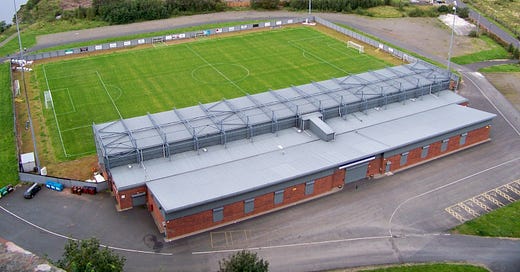The Mystery of the Missing £1.8m - how Dumbarton hit the rocks
Mired at the foot of League One after a 15-point penalty and with police investigating alleged fraud, only fundraising by fans is keeping a 152-year-old club in the game
Every month, Nick Harris, author of the brilliant on Substack, writes for Nutmeg. Please check out his work on the intersection between sport and data, corruption and money.
Dumbarton were placed into administration at the start of last week, in what can only be described as mysterious circumstances, in yet another footballing collapse that raises serious questions about governance in the game.
Administrators Quantuma said the club’s insolvency was “following the non-receipt of significant funds that were owed to the club from the sale of development land in 2021.”
To put that in plain language, somebody sold land that was owned by the club, for the not inconsiderable sum of £1,848,800. And the club didn’t see a penny of it. And the money is, effectively, missing.
With cash flow insufficient, the club’s directors were left with “no other option” than to bring in Quantuma.
So far, so simple. We appear to have yet another example in British football of somebody getting involved in a club that has assets, and then those assets going AWOL.
Dumbarton have been deducted 15 points for entering administration to take them to the bottom of Scotland’s third-tier League One.
The players and staff now have fears about their futures and their livelihoods, although, as we shall see shortly, fundraising to address that is going well.
Why should anyone but fans of this one small club care? Because it’s also a complex case, now involving the police, who are investigating suspected fraud.
And because the demise of Dumbarton since 2021 has shown yet again the woeful lack of safeguards for many football clubs.
This in turn is reigniting a debate about whether the Scottish game needs an independent regulator. The independent regulator being delivered by the Labour government will only regulate in England.
Dumbarton have a long, proud history. They won the first two top-flight titles in Scottish football history, in 1890-91 and 1891-92.
That first title was shared with Rangers after both teams finished on the same number of points, and a play-off game then ended 2-2. The second title they won outright, with Celtic in second place.
The Sons (so-called because Dumbarton-born folk are ‘the sons of the rock’, the rock being Dumbarton Rock, the 240ft-high volcanic plug that towers above the town) won the Scottish Cup in 1883 and were runners-up on five other occasions between 1881 and 1897.
At one point late in the 19th century, Dumbarton was a prime source of footballing talent for big clubs in England. Between 1889 and 1897, six footballers hailing from Dumbarton played for Everton alone: Alex Latta, Dickie Boyle, Abe Hartley, the Bell brothers John and Laurie, and Jack Taylor.
Oh, and Dumbarton tried to sign Johan Cruyff, back in 1980.
But back to the club’s current woes.
Dumbarton changed hands in 2021, when a company called Cognitive Capital Limited took charge, buying the majority shareholding of a company called Brabco 736, which was based in St Helens, Merseyside.
The two main figures behind Cognitive were Henning Kirstoffersen, who described himself as “a Norwegian financial services entrepreneur”, and Matthew Atkinson, a Manchester-based architect. They released a statement outlining their plans for the club.
One of their promises was that “the Hosie family will retain a stake at the club, maintaining their 50+ year association with DFC.”
Multiple members of the aforementioned Hoise family had held significant roles in Dumbarton’s history and they included the late DFC director Callum Hosie; Callum’s son Andrew Hosie, with whom he had formed Brabco 736 to take control of Dumbarton in 2007; and Callum’s cousin, Colin Hosie, who has served as both DFC’s chairman and vice-chairman.
The May 2021 statement was not specific about the Hosie family involvement going forward although in July 2021, as rumours swirled that Dumbarton could be in financial trouble, Kirstoffersen publicly backed Andrew Hosie to help him, despite the latter having been struck off for 12 years as a company director having lost £7.161m of investors’ money in a gambling venture.
Kirstoffersen said in July 2021 that he retained faith in Andrew Hosie as an advisor. “Andrew has a degree from Cambridge University, 10 years experience at Procter and Gamble, the world’s biggest marketing company, five years experience as a commercial director of Everton Football Club and 15 years sports marketing with other clubs - plus he has never taken a penny from Dumbarton and will work for nothing.
“Yes, he has a high-profile business failure but in my experience he is 100% honourable.”
Their 2021 statement included a klaxon-inducing sentence
Cognitive said in 2021 that Kirstoffersen would lead on football matters at DFC while Atkinson would lead on property and stadium matters. Their 2021 statement included the klaxon-inducing sentence that Cognitive would “look to develop the planning permission at Castle Road to financially support the club and contribute towards the new stadium.”
In April 2021, club-owned land was sold to a firm called More Homes DFC Limited, a subsidiary of Cognitive Capital Limited.
The land was going to be developed into housing and flats, with the club due to receive £1,848,800 “dependent on the successful completion of a residential development on the land sold.”
This money was due in two instalments: the first of £300,000 in April 2023, with £1,548,000 more in April 2026. None of the money has been paid.
When Dumbarton went into administration last week, the Sons Supporters Trust issued a statement including the following. “The Trust would hope that any legal due diligence associated with the administration process would encompass the provenance and detail of the funding arrangements for that [2021 land] purchase, [and] also the suspected transfer of a portion of land previously belonging to the football club to a shell housing development company created by Cognitive Capital Limited, done without either the knowledge or approval of the Dumbarton FC Board of Directors in place at that time.”
So where is the money? And who, specifically, was actually involved in the sale and purchase of the land?
Subsequent to the administration, Police Scotland confirmed they were involved in an ongoing investigation into reported fraud at Dumbarton FC, following a tip-off.
A spokesperson said: “On Tuesday, October 29, 2024, we received a report of suspected fraud at a football club in Dumbarton. Enquiries are ongoing.”
Alarm bells were ringing in political circles about Dumbarton as long ago as January of this year, when Jackie Baillie, the MSP for Dumbarton, raised the matter in the Scottish Parliament.
Addressing Dumbarton’s situation at length, she said: “The Sons Supporters Trust has told me that, for nearly two decades, Dumbarton has been in the hands of owners whose primary interest appears to be land and property deals, and who have frequently failed to deliver the resources that were promised to the club.
“they have treated clubs like Dumbarton like development opportunities to get rich quick”
“Reportedly, they have stalled possible community development because of a get-rich pipe dream. Instead of treating clubs such as Dumbarton with the respect that they deserve, they have been treated like development opportunities to get rich quick.
“That issue does not affect only clubs in Scotland. Across the UK, clubs in England and Wales have been snapped up by multimillionaires. Sometimes, that has not worked well and we have seen managed decline and fans’ wishes being steamrolled, taking the heart out of the sport that we all love.
“Proposals for greater scrutiny are, as we have heard, being brought forward for the rest of the UK, which is positive, but we must likewise ensure the regulation of Scottish football so that we are not left behind. We must come together for our communities and clubs to guarantee that public interest is at the forefront of football ownership, that Scottish football is run for the benefit of the people and that accountability can flourish.”
There is likely to be strong resistance to an independent regulator for Scottish football, not least from the Scottish FA. This was a subject explored at length earlier this month in this piece by Chris McLaughlin, BBC Scotland’s sports news correspondent.
Rumours abound about who has profited from selling Dumbarton’s land but with an active police investigation underway, this forum is not the place for those rumours.
In more positive news, a GoFundMe page to raise money to help the club had raised more than £86,000 by Wednesday evening. It is understood that Quantuma have assessed that the club has a cash flow shortfall of £100,000 between now and the end of the season while still paying all the players and staff.
The fundraising has already nearly covered that, and is expected to continue to grow, not least at the first post-administration match, Dumbarton’s home cup game against Alloa on Friday evening.
The search for new owners is underway. The Supporters Trust would welcome a partnership with any interested and credible party.
The search for the truth about the missing £1.8m, meanwhile, goes on.






